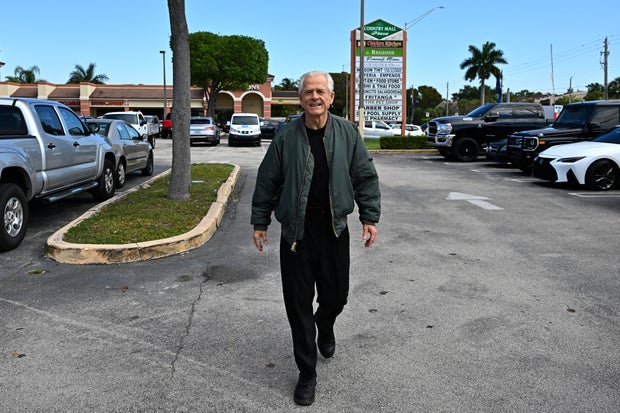Washington — Peter Navarro, who served as White House trade adviser to former President Donald Trump, is turning himself in to a federal prison in Miami on Tuesday after Chief Justice John Roberts rejected his 11th-hour bid to remain free while he appeals his conviction for contempt of Congress.
Before surrendering to begin serving his four-month sentence, Navarro claimed his case represents an “unprecedented assault” on the separation of powers and executive privilege.
“When I walk in that prison today, the justice system such as it is will have done a crippling blow to the constitutional separation of powers and executive privilege,” he said in remarks to reporters delivered from a strip mall parking lot near the prison.
Navarro pledged to appeal his conviction up to the Supreme Court and claimed his conviction stemmed from the actions of lawmakers, prosecutors and judges who are “Trump-haters.” There is no evidence that his prosecution was politically motivated.
“This is the partisan weaponization of our judicial system,” Navarro said, taking issue with a ruling that barred him from presenting certain defenses to the jury that is now one of the subjects of his appeal.
He is the first former White House official to go to prison after being convicted of contempt of Congress.
Navarro was charged and found guilty after he refused to comply with a subpoena from the House select committee that investigated the Jan. 6, 2021, attack on the Capitol. Congressional investigators were seeking documents and testimony from the former White House official tied to his post 2020-election conduct and efforts to delay the certification of Electoral College votes.
He was sentenced to four months in prison in January. He appealed both his conviction and the trial judge’s decision to enforce his sentence as the appeal is further litigated. Navarro has long held that he thought he was bound by executive privilege when he refused to comply with the committee’s demands, but the judge overseeing his case ruled there was no evidence that the privilege was actually invoked.
Navarro has been ordered to turn himself into federal prison in Miami by Tuesday.
A three-judge panel on the D.C. Circuit Court of Appeals already rejected his bid to delay the sentence, writing he was unlikely to secure a new trial or reverse his conviction.
In urging the Supreme Court to grant him emergency relief and put a hold on his surrender, Navarro’s lawyers argued that he is neither a flight risk nor a threat to public safety, and therefore should be allowed to remain free while he pursues his appeal.
“Dr. Navarro is the only former senior presidential advisor to be prosecuted for contempt of Congress following an assertion of executive privilege by the president that advisor served,” his attorneys wrote in their request to the court.
They told the justices that Navarro’s prosecution for contempt of Congress violated the separation of powers doctrine, so his conviction must be reversed and the indictment against him dismissed.
His legal team also argued that the questions Navarro plans to raise on appeal, which involve the assertion of executive privilege, are ones that have not been answered before, and therefore warrant his release for now.
“Dr. Navarro does not dispute that his failure to comply with the congressional subpoena at issue was deliberate. Rather, he contests that any such prosecution was consistent with the separation of powers doctrine,” they said. “Not once before Dr. Navarro’s prosecution has the Department of Justice concluded a senior presidential advisor may be prosecuted for contempt of Congress following an assertion of executive privilege.”
The Justice Department opposed Navarro’s bid for release, and argued that he fell short of meeting the standard for such relief.
Roberts wrote in his order that he saw “no basis to disagree with the determination that Navarro forfeited those arguments in the release proceeding, which is distinct from his pending appeal on the merits.” He acted alone as the justice who oversees requests from emergency relief arising from the District of Columbia Circuit.
Many of the records the Jan. 6 select committee was seeking were personal communications that couldn’t implicate executive privilege, the Biden administration said, and Navarro is not contesting the district court’s finding that Trump did not actually assert the privilege.
“If privilege was never asserted, it cannot be a defense to the prosecution here,” wrote Solicitor General Elizabeth Prelogar, who represents the federal government before the Supreme Court.
Prelogar noted that presidents often decline to assert executive privilege in response to congressional subpoenas, and said the president’s superiority in that process would be “gravely undermined” if a subordinate — Navarro in this case — could override that determination.
Navarro’s “suggestion that he was ‘duty-bound’ to claim executive privilege notwithstanding former President Trump’s failure to assert it thus gets things exactly backward,” she wrote.
Navarro was not the first Trump administration official to be convicted of defying Jan. 6 Committee demands, but he will be the first to report to prison. Former White House chief strategist Steve Bannon was found guilty of two counts of contempt of Congress and sentenced to four months in prison, but the judge overseeing his case paused the prison term as Bannon pursues an appeal of his own, writing it was likely his conviction could be reversed.

